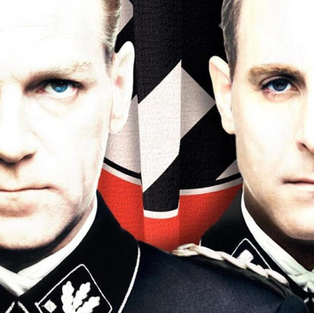Script
Whether you are a conspiracy theorist or not, it is difficult to watch Conspiracy without imagining the same event happening today, now. Different participants gathered together secretly planning the demise of population groups.
Loring Mandel, was an American playwright and screenwriter probably best known (aside from Conspiracy) for writing George Roy Hill's, The Little Drummer Girl starring Diane Keaton.
Mandel's Conspiracy is a difficult film to watch. The film dramatizes the top-secret 1942 Wannsee Conference, where 15 Nazi officials developed the Final Solution, the Nazi plan to annihilate Europe’s Jewish population.
In an interview with Alexander Tang of the Harvard Crimson, Mandel said, "it was the first Holocaust thing that he had seen that didn’t move him to tears, but moved him to anger, and that was the reason that he thought that it should be done."
Mandel did a tremendous amount of research for the script simply because the original document about the secret Nazi meeting wasn't enough information. The document contained the cast of characters and the sequence of events, but there was other information about Eichmann and the other meeting participants that was required. Mandel spent time in the archives of the Holocaust Museum, reviewed transcripts of the Eichmann testimony, visited the Leo Baeck Institute in New York, the YIVO Institute for Jewish Research in New York, the museum in the building where the conference took place, and Simon Wiesenthal Center in Los Angeles. When he finally had enough of a feel of the background and the participants, he wrote the first draft.
The dialogue is rich and difficult to follow at times. But the underlying brunt and force of what is being discussed is shocking and heart wrenching. It will indeed leave you angry. Yet how many times have you heard the phrase, "we must remember so it doesn't happen again?" But even now, be it ethnic, religious, pandemic, virus or otherwise, politics are heavily in play at some level somewhere, and it is just a matter of time before the truth of the next secret meeting and conspiracy is revealed.
Characters
Kenneth Branagh is superb and distasteful in his role as Reinhard Heydrich. His opening phrase is alarming and sets the stage for the 90 minutes of gut wrenching dialogue which follows, "So to begin. We have a storage problem in Germany, with these Jews."
Reinhard Tristan Eugen Heydrich was a high-ranking German SS and police official during the Nazi era and a main architect of the Holocaust.
Though Branagh has played many historic roles, this may be his best. His character is unmoved, unafraid and his vision resolved. He has not only a duty but a deep sense of obligation and is unswayed in carrying out Hitler's plan to eradicate the Jewish people from history.
Stanley Tucci plays an equally harsh and cynical character. With a smerk on his face, he jokes and jesters the demise of the Jewish race. His role as Adolf Eichmann is seasoned with gestures of arrogance and ignorance yet as viewers it is clear Eichmann knew exactly what he was doing and for what cause.
Colin Firth plays Dr. Wilhelm Stuckart, the German Nazi Party lawyer. According to the minutes of the Wannsee Conference, Stuckart supported forced sterilization for persons of "mixed blood" instead of extermination.
Music
There is no music. With the exception of the ending, wherein Frank Schubert's Adagio String Quintet in C Major is played on a phonograph. The piece was performed by Ensemble Villa Musica courtesy of Naxos of America by arrangement with Source Q.
Adagio and the close of the film are a haunting reminder that though we may never forget the horror of the holocaust, we are naive to think it will never happen again. Somewhere, in secret, there are those that are planning the demise and destruction of others, to be certain.






Comments